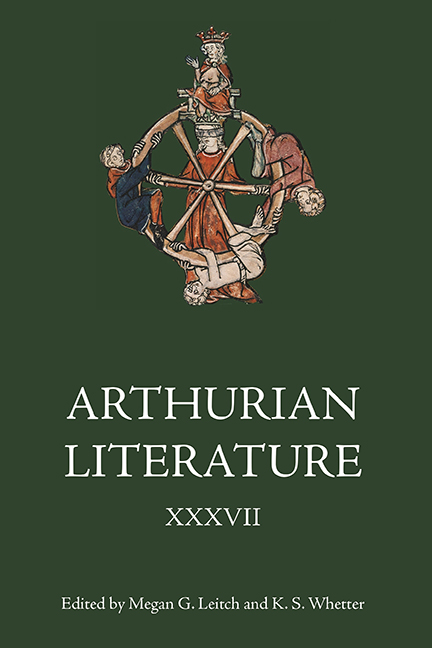Book contents
- Frontmatter
- Contents
- List of Charts and Tables
- Professor Fiona Tolhurst (1968–2021)
- General Editors’ Preface
- List of Contributors
- List of Abbreviations
- Introduction: The Tournament at Mapplemalleoré: Malory at 550
- 1 Malory and the Stock Phrase
- 2 The Artistry of Malory’s Mercantile Metaphors: Goods, Generosity, and the Source of ‘The Tale of Sir Gareth’
- 3 ‘A grete bourder and a passynge good knyght’: Sir Dinadan: ‘Gareth with a Twist’
- 4 Moonlight in the Nocturnal Typology of Malory’s Morte Darthur
- 5 ‘That shall nat ye know for me as at thys tyme’: Cognitive Narratology and Filling Malory’s Gaps
- 6 ‘On a tyme’: Action and Temporality in Malory’s ‘Sankgreal’
- 7 Hospitality in Malory
- 8 The Haunting of the Orkneys and Malory’s Arthurian Project
- 9 ‘I love nat to be constreyned to love’: Launcelot and Coerced Sex
- 10 Eradicating Victorian Backreading: Re-reading Malory’s Gwenyvere through Gaynour and Isode
- contents of previous volumes
4 - Moonlight in the Nocturnal Typology of Malory’s Morte Darthur
Published online by Cambridge University Press: 15 September 2022
- Frontmatter
- Contents
- List of Charts and Tables
- Professor Fiona Tolhurst (1968–2021)
- General Editors’ Preface
- List of Contributors
- List of Abbreviations
- Introduction: The Tournament at Mapplemalleoré: Malory at 550
- 1 Malory and the Stock Phrase
- 2 The Artistry of Malory’s Mercantile Metaphors: Goods, Generosity, and the Source of ‘The Tale of Sir Gareth’
- 3 ‘A grete bourder and a passynge good knyght’: Sir Dinadan: ‘Gareth with a Twist’
- 4 Moonlight in the Nocturnal Typology of Malory’s Morte Darthur
- 5 ‘That shall nat ye know for me as at thys tyme’: Cognitive Narratology and Filling Malory’s Gaps
- 6 ‘On a tyme’: Action and Temporality in Malory’s ‘Sankgreal’
- 7 Hospitality in Malory
- 8 The Haunting of the Orkneys and Malory’s Arthurian Project
- 9 ‘I love nat to be constreyned to love’: Launcelot and Coerced Sex
- 10 Eradicating Victorian Backreading: Re-reading Malory’s Gwenyvere through Gaynour and Isode
- contents of previous volumes
Summary
When he concluded Le Morte Darthur, one of the most striking narrative choices that Sir Thomas Malory made was to reject the chronology and daytime setting of Arthur's death scene in the Vulgate Cycle's Mort Artu. In the Mort Artu, after defeating Mordred, Arthur spends the rest of the day and night in prayer. When Arthur charges Girflet to return Excalibur, it is noon on the day after Mordred's death. Rain falls when Morgan arrives in her barge later that day. For the rest of that day and all night, Girflet remains at the shore, bereft. The next morning, with the sun shining once again, he rides to a copse. There he encounters a hermit with whom he stays for two days. On the third day, he goes to the Black Chapel, where, at noon, he finds the tombs of Arthur and Lucan.
Malory's version of the death scene instead follows an English source, the Stanzaic Morte Arthur, where the entire sequence, which takes several days in the Mort Artu, lasts only from evening until morning of the next day. As Malory has it, once battle is joined, the two sides ‘fought all the longe day, and never stynted tylle the noble knyghtes were layde to the colde erthe. And ever they fought stylle tylle hit was nere nyght, and by than was there an hondred thousande leyde dede uppon the downe’ (922.29–32). At this point, Arthur looks around and sees only Lucan and Bedwere alive from his army. It is sunset or later when Mordred and Arthur fight. It is night when Lucan and Bedwere bring Arthur to a chapel near the seaside. Looters are at work stripping the dead of their valuables and killing the dying for theirs. As the only occurrence of battlefield plunder in Le Morte Darthur, this moment signals the dissolution of Arthurian chivalry and civil society caused by Mordred's usurpation and the ensuing war. The sequence continues from there without interruption: Lucan collapses and dies trying to carry Arthur further, Bedwere hurls Excalibur into the lake, Bedwere carries Arthur on his back to the water's side, the weeping queens bear Arthur away, and Bedwere runs grieving through the forest for the rest of the night.
- Type
- Chapter
- Information
- Arthurian Literature XXXVIIMalory at 550: Old and New, pp. 67 - 88Publisher: Boydell & BrewerPrint publication year: 2022



